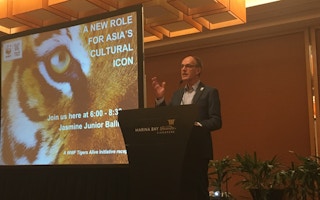A Donald Trump presidency in the United States may not spell the kind of doom and gloom for the sustainability movement that many are expecting, but there is a need to “draw a line in the sand” with the president-elect over his environmental policies, the head of World Wide Fund for Nature (WWF) has said.
Talking to Eco-Business after a tiger conservation event in Singapore recently, Marco Lambertini, director general of WWF International was careful to avoid using any alarmist language when asked what he expects of the president-elect’s policymaking, despite Trump’s appointment of a well-known climate change denier as head of the United States Environmental Protection Agency.
“It’s difficult to judge what the Donald Trump campaigner means versus what the Donald Trump president will do. The jury is still out,” Lambertini said, who is based in Switzerland.
“We’ve seen examples from the past of [presidential] candidates using certain rhetoric during the elections, but when reality kicks in they follow a different course of action.”
He added: “WWF continues to be committed to work with any leadership in order to achieve our mission.”
“It would be too easy to respond emotionally to statements that obviously we’re concerned about, like dumping the Paris Agreement,” said Lambertini.
The property mogul turned politician promised to “rip up” the UN-brokered multilateral deal to reduce greenhouse gas emissions during his election campaign, and did not have a representative from his camp present at the UN Climate talks in Marrakesh in November.
Lambertini said that WWF would “judge and respond when things become real and more than a speech, and become actual political programmes”.
“We will have to draw a line in the sand on where we agree [with Trump’s policies], and we will have to speak out when necessary. And at the same time we will have to make ourselves available to try to convince president Trump over what we believe is the right course of action.”
He later pointed to states such as California that were pressing on with aggressive green policies regardless of what might happen at a national level. He believes that climate scepticism would not avert what he sees as an irreversible trend of businesses internalising the bottom line benefits of going green.
“So I don’t think climate scepticism will be able to convince businesses that climate change is not a problem, as many of them are already facing the direct impact [of climate change],” he said.
He cited the case of Coca-Cola halting the production of bottled drinks in Namibia in May due to drought: “This is real stuff. It means a lot of money lost.”
Climate scepticism “won’t help accelerate that [sustainability] journey, but I don’t think it will avert it,” he said.
In Asia, the question remains whether businesses are adopting sustainable practices urgently enough, says Lambertini. But he remains positive.
China already leads the way in sustainability thinking and action, being “several times over” the world’s biggest investor in renewable energy. Five years ago, for example, the world’s biggest carbon emitter banned the building of new coal power stations, Lambertini noted.
“Of course the issues are still huge, but the price of solar power has been falling constantly and steadily. For the first time in history, the investment in renewable energy - driven by China - has surpassed investment in fossil fuels. The trend is very clear.”
“The challenge is scale and speed. That’s the challenge we’re facing,” he said.
Lambertini has been a conservationist for all of his working life, moving into the top job at WWF in 2014. He joined from BirdLife International, where he was chief executive, the appointment marking a return for the Italian who had volunteered for WWF as a teenager.
“
I think the journey is set. We are heading towards a decarbonised economy.
Marco Lambertini, director general, WWF
“I’ve been in conservation since I was 12 years old - for 45 years. I have never been more excited than now,” he said.
“Frankly, for the first time I am seeing the conservation movement being able to ride a wave of change instead of trying to stop a wave that was coming our way.”
“It’s an unusual feeling for us. We continue to fight. Don’t get me wrong. There’s a lot to do. But for the first time we feel like we are supporting change, and that’s a great feeling.”
As for Trump coming in power and how much he could derail this movement, he preferred to keep an open mind.
“Let’s see what happens. We cannot pass judgement right now,” he said.
“But I think the journey is set. We are heading towards a decarbonised economy.”

















